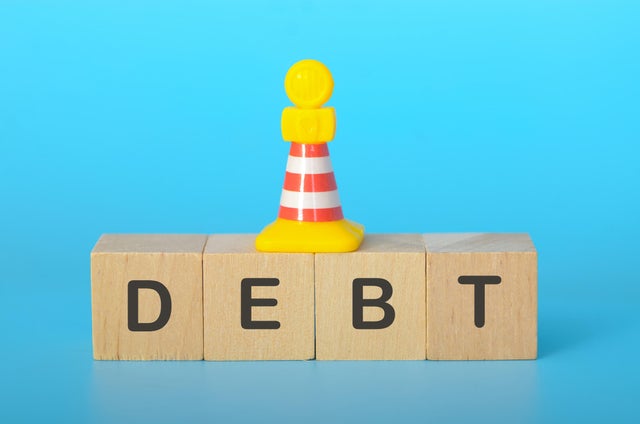Does disputing a debt hurt your credit? Here's what borrowers should know.
When you see a debt pop up on your credit report that doesn't look familiar, or one that lists the wrong balance or dates, it's natural to panic. Errors on credit reports are more common than many borrowers realize, especially with lenders and debt collectors managing high volumes of accounts in today's still-elevated borrowing environment. And, considering that your credit score influences everything from loan approvals to interest rates, it makes sense to scrutinize every line of your report.
At the same time, Americans are carrying heavier debt loads than they were just a few years ago, and delinquencies have been rising at a steady pace. There has also been an uptick in debt collection activity and debt-related lawsuits recently, which have contributed to more borrowers closely reviewing their reports for mistakes. That extra layer of vigilance is a good thing, but it also raises an important question: What happens to your credit if you challenge something that looks wrong?
Many borrowers worry that simply disputing a debt, even if they're convinced it's inaccurate, could somehow put a dent in their score or spark more issues with debt collectors. But while the dispute process can temporarily shift how an account appears on your report, the effect isn't always what people expect.
Find out what strategies you can use to start tackling your high-rate debt today.
Does disputing a debt hurt your credit?
In most cases, disputing a debt does not directly hurt your credit score. The credit bureaus allow borrowers to challenge information they believe is inaccurate, incomplete or outdated. When you file a dispute with Experian, Equifax or TransUnion, the bureau is required to investigate, usually within 30 days, and mark the entry as "disputed" during the review.
That disputed notation typically does not lower your score. In fact, some lenders may disregard negative information tied to a disputed account while the investigation is active. But that doesn't mean the dispute process is entirely risk-free. The bigger concern is what happens once the investigation ends.
If the information turns out to be accurate, the account will remain on your report, and any negative history associated with it will continue to affect your score. That could include missed payments, a charge-off or even a collection entry. Disputing doesn't erase valid debt; it only corrects errors. So if the debt belongs to you and the lender verifies the details, the dispute won't improve your score, and the original negative effect remains.
Another thing borrowers often overlook: If you repeatedly dispute the same legitimate debt or send incomplete information, the bureaus may label the disputes as "frivolous" and decline to investigate, which can delay any resolution. And while disputing itself doesn't lower your score, the underlying debt still can, especially if it goes unpaid during the process. A dispute doesn't pause delinquency reporting, either, so the lender may continue adding late payments if the debt is active and overdue.
Chat with a debt relief expert about the help that's available to you now.
What to do if the dispute doesn't resolve your debt issue
Sometimes borrowers file a dispute while hoping it will make a troubling debt disappear, only to find that the lender verifies the information and the account stays put. If that happens, it's important to pivot quickly and explore your options to prevent further credit damage.
Start by confirming the full details of the debt. You're entitled to request validation from the debt collector, including proof that you owe the balance and documentation showing how the amount was calculated. If anything still looks inaccurate, you may be able to challenge the debt with the lender directly or escalate your case to the Consumer Financial Protection Bureau.
But if the debt is valid, and especially if you're struggling to pay it, your credit may continue to take hits until you find a solution. That's where debt relief strategies can help. Depending on your situation, you might benefit from:
Debt settlement
Working with a reputable debt relief company to negotiate a reduced payoff amount can help you get out of debt faster and for less than what you currently owe. This option typically requires you to stop making payments and allow your accounts to go delinquent as you save for lump-sum settlements, but it can help you resolve high-balance accounts for significantly less than you owe.
Debt management
By enrolling in debt management through a credit counseling agency, you can roll your eligible credit card balances into a single monthly payment, typically with reduced interest rates and fees. By taking this route, you can make your debt more affordable and help prevent further damage to your credit.
Debt consolidation
If you still have fair or good credit, consolidating multiple debts into one fixed-rate personal loan can simplify repayment and potentially lower your overall interest costs. And, having one fixed monthly payment can make it easier to manage and pay off your debt over time.
The bottom line
Disputing a debt typically does not harm your credit, and for inaccurate entries, it's one of the most effective ways to protect your score. But a dispute won't erase legitimate debt, and once the investigation ends, any verified negative information can continue to weigh down your report. If the debt turns out to be valid and repayment feels out of reach, you may want to explore the debt relief solutions that can help you manage or resolve what you owe before more credit damage occurs.
